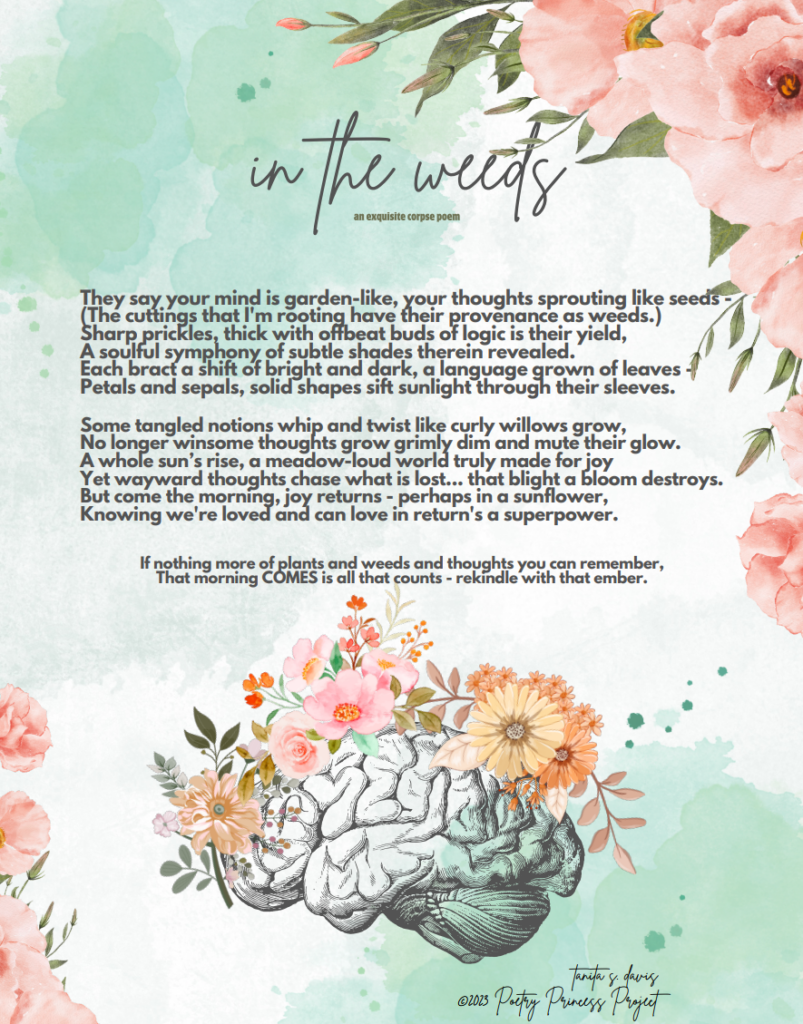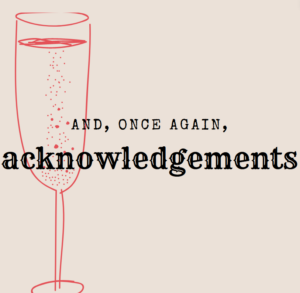Welcome to another Poetry Friday Poetry adventure!
Poetry Peeps! You’re invited to our challenge for the month of September! Here’s the scoop: We’re writing a Diminishing — OR a Culminating Verse – Wikipedia calls them “pruning poems.” The last word in each line loses a letter from the end, yet remains a word – for instance, sticky becomes tick-y, and then icky. This will force you to use all your wiles, and will also force us to produce some pretty short poems. Are you in? Good! The Poetry Sisters are continuing to throw our 2023 theme of TRANSFORMATION into the mix. If you’re still game, you have a month to craft your creation and share it on September 29th in a post and/or on social media with the tag #PoetryPals.
I’ve fallen in love with the oddly named Exquisite Corpse poetry form. Perhaps it’s the fact that it is kind of Poetry, But Make It A Game, and there’s failure already baked in from scratch that makes it so compulsively enjoyable. If everyone in your neighborhood right now rolled up to your front porch with a line from a poem (already written or original), you know that lined up in they order of arrival, it would be complete gibberish. And yet! That you can massage it into some kind of shape from there is such a fun and freeing notion.
We’ve played with corps — ew, no. We’ve DONE THIS FORM before, but this time, the Poetry Sisters chose to mine Linda Mitchell’s clunkers for help as well as our brains – giving us quite a few more lines to work with, and, oddly, some kind of a theme. There’s no waste in wordplay, and we love to see a good line reused. A fine example of a great revision of an exquisite corpse can be found in Tricia’s story poem. Or Kelly’s sonnet.. Or Liz’s spare lines. Here’s Sara’s wordsmithing, and here’s Laura’s poem. Here’s Linda M. and Michelle K.’s collaborative corpses. Other participating Poetry Peeps will be posting throughout the weekend, so check back for a full-roundup.
So, when we met last Sunday, we threw our lines into the “bucket,” and this is what we found:”
An Exquisite Draft
They say the mind is garden-like, with thoughts as sprouting seeds
*but I’m left holding cuttings I’m not sure where to plant
Weedy-thick, the prickly buds of odd logic bloom:
*You don’t cry anymore, but you sing all the words.
Each line in a different language as the light shifts,
*trees turned so orange the road looked blue.
Words tangle, colors muddy in the palette.
*I am no longer winsome to the sun.
*a whole sun’s rise to share
there goes the one that got away
*found a bit of sunflower
and plucked every petal (by the way, he loves me)
and then I remembered
*that’s what you wrote about the green beans
Stockpile, then, that snap and sass to sweeten your September.
In a way, this is already a poem. Even without knowing the other lines folks had chosen, we selected a lot of imagery of the natural world, of colors, and then, of … emotional states? Moods?? Most of us loved different bits of it, and most of had an idea of what we could do with it.
I… had no idea what to do with it.
It was my own fault. Mine was the first line, and it was a teensy bit of mockery for a Hallmark-esque phrase I heard a lot in junior high. ““Your mind is a garden. Your thoughts are the seeds. You can grow flowers or you can grow weeds.” And yes, please read that in the sing-songy little tone it deserves. This is akin to the sing-songy little “Everyone has two wolves” quote – both of which, don’t get me wrong, are PERFECTLY FINE analogies for how much control we have over our attitudes. PLEASE don’t feel weird if these are among your most beloved lines. Hearing them and others like them so much while growing up, however, mainly made me resentful of being told I could curate my thoughts like plants, and somehow yank out what was objectionable. In the brain-itchy, out-of-control emotional state of adolescence, I generally felt like my thoughts were MOSTLY weeds, so how was I supposed to cultivate the delicate freakin’ flowers everyone wanted of me???
Well. When you start a poem with snark, you have to end it with something a little better. So, I worked at this one — and while it’s still pretty much sing-songy drivel, I had fun with it.
Basically, that’s what counts.
In The Weeds
They say your mind is garden-like, your thoughts sprouting like seeds
(The cuttings that I’m rooting have their provenance as weeds.)
Sharp prickles, thick with offbeat buds of logic is their yield,
A soulful symphony of subtle shades therein revealed.
Each bract a shift of bright and dark, a language grown of leaves –
Petals and sepals, solid shapes sift sunlight through their sleeves.
Some tangled notions whip and twist like curly willows grow.
No-longer-winsome thoughts grow grimly dim and mute their glow.
A whole sun’s rise, a meadow-loud world truly made for joy
Yet wayward thoughts chase what is lost …that blight a bloom destroys.
But come the morning, light returns – perhaps cupped in sunflowers,
Knowing we’re loved and love’s returned remains a superpower.
If nothing more of plants and weeds and thoughts you can remember
That morning COMES is all that counts – rekindle with that ember.
Poetry Friday is ably hosted today by Linda Baie over at TeacherDance – thanks, Linda, for taking time in your busy school-time for poetry!
And now it’s time to tend your gardens – the weekend comes to make us take time for rest and a bit of raking, maybe. Be good to yourselves friends — even if you do grow weeds.


